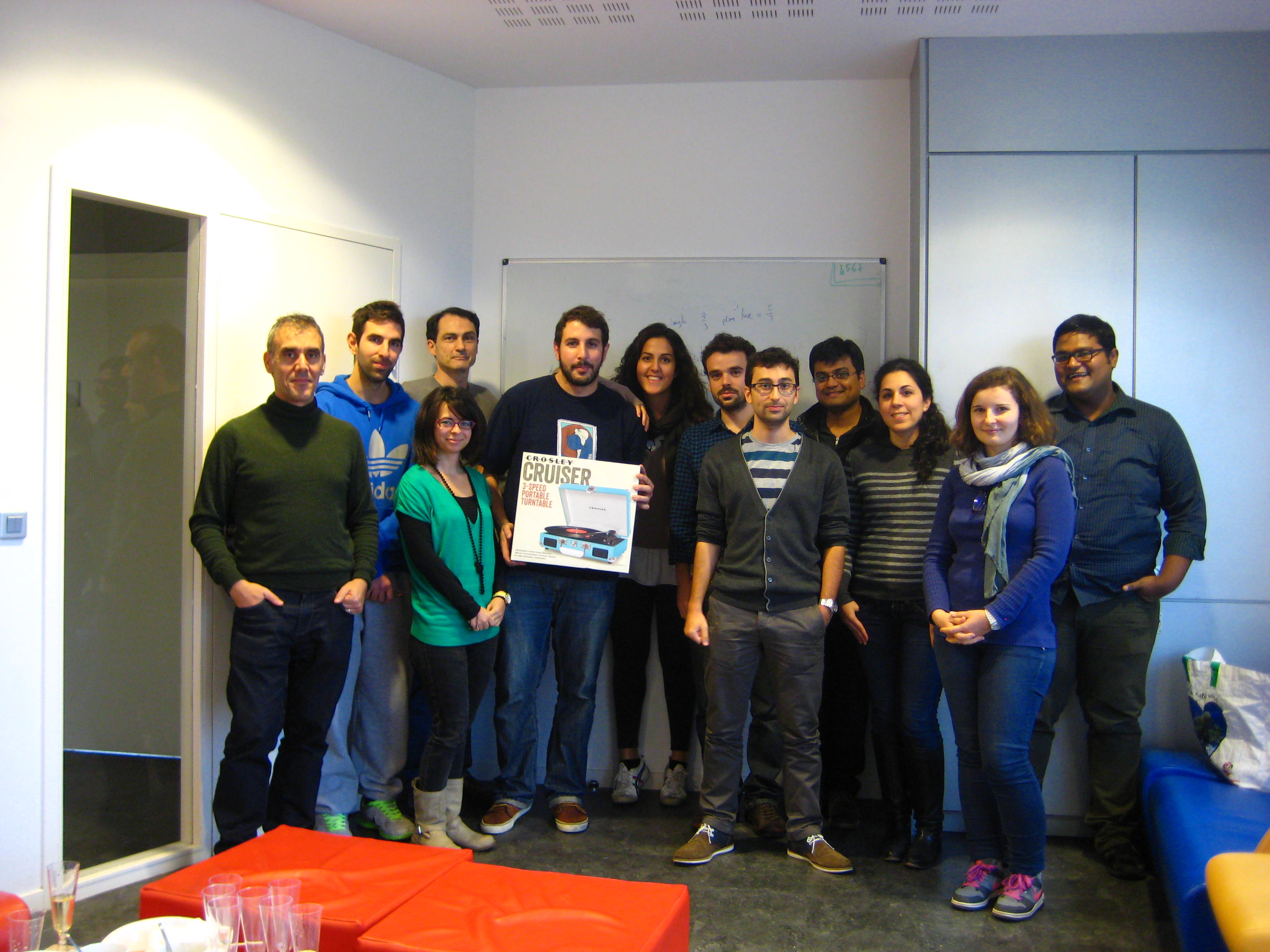
Andrés has finished his 2-years contract and made a small farewell party yesterday. Thank you Andrés, and good luck!
Oct 17

Andrés has finished his 2-years contract and made a small farewell party yesterday. Thank you Andrés, and good luck!
Permanent link to this article: https://team.inria.fr/oak/2013/10/17/andres-farewell-party/
Oct 14
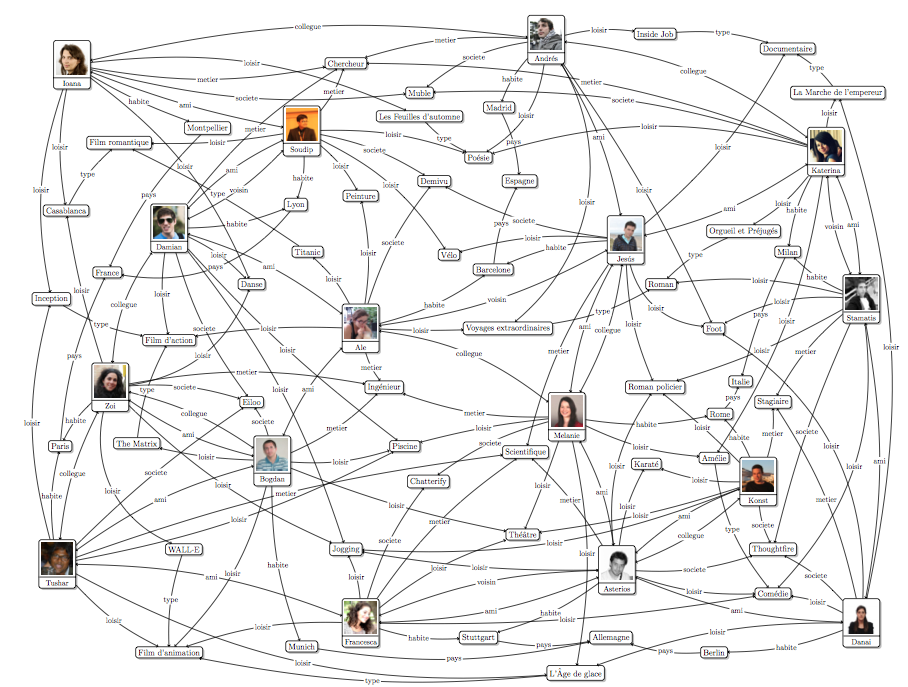
Oak partipated in representing Inria Saclay at Fête de la Science 2013. Alexandra, Tushar, Stamatis, Katerina, Dario and Ioana took turns in presenting RDF graphs, views and warehouses to 400+ visitors!
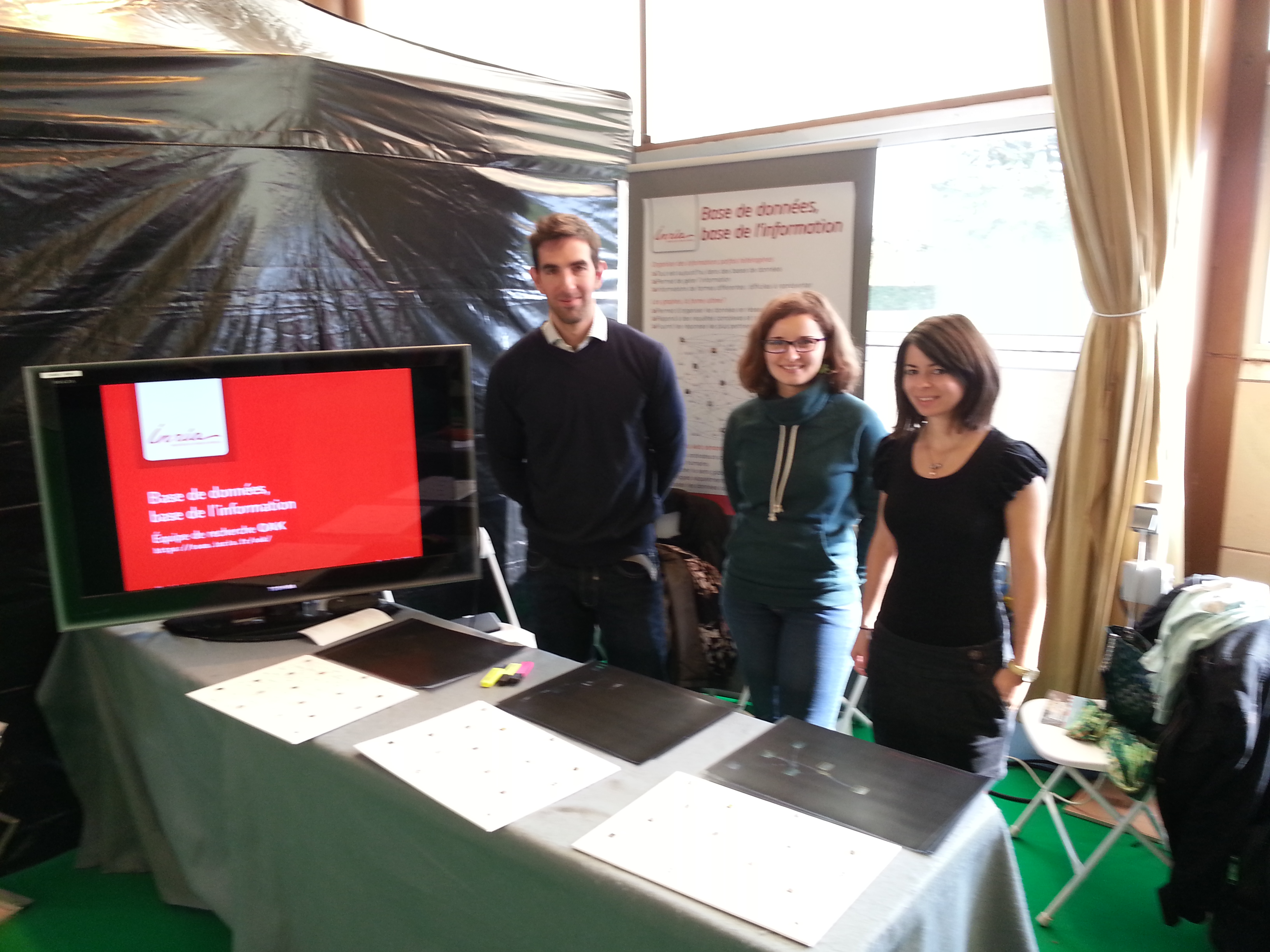
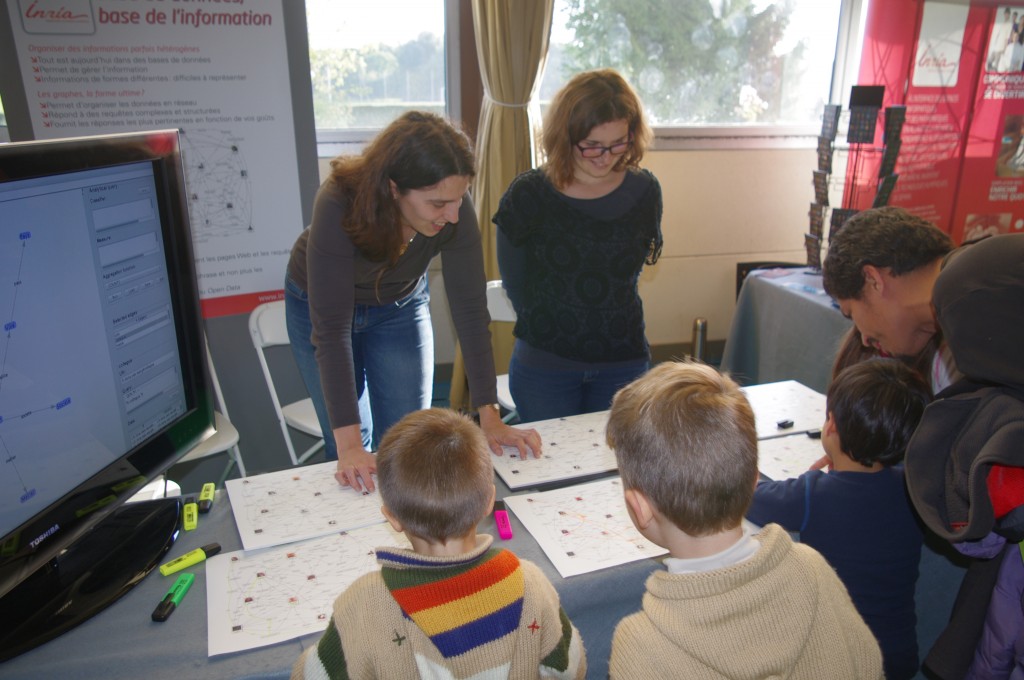
Permanent link to this article: https://team.inria.fr/oak/2013/10/14/oak-in-fete-de-la-science-2013/
Oct 06
“Delta: Scalable Data Dissemination under Capacity Constraints”, by Konstantinos Karanasos, Asterios Katsifodimos and Ioana Manolescu has been accepted for publication in PVLDB 2014.
Permanent link to this article: https://team.inria.fr/oak/2013/10/06/pvldb-delta-scalable-data-dissemination-under-capacity-constraints/
Oct 04
15.00, room 445, PCRI
Abstract
Wikipedia is one of the most used information source, however being freely editable raises concerns over the quality of this information. Using Wikitrust, a trust network over Wikipedia created by DBWeb, we will try and tackle one of the major challenges of the online encyclopedia : create a trustworthiness model of its content.
Permanent link to this article: https://team.inria.fr/oak/2013/10/04/raphael-bonaque-trustworthiness-inference-in-wikipedia/
Sep 27
14.00, room 455, PCRI
Abstract
In recent years, we developed CrowdSearcher, which integrates a conceptual framework, a specification procedure and a reactive execution control environment for designing, deploying, and monitoring crowd-based applications on top of social systems, including social networks and crowdsourcing platforms.
We show how social platforms, such as Facebook or Twitter, can be used for crowdsourcing search-related tasks, side by side with traditional crowdsourcing platforms; and we show how controlling the quality of performers and of results can lead to increased performance and interoperability.
The contribution of this talk is a broad vision that brings together crowdsourcing, social networking, expertise finding, reactive rules and multi-platform system integration, at the purpose of increasing effectiveness of crowd-based applications.
Short bio
Stefano Ceri is professor of Database Systems at the Dipartimento di Elettronica, Informazione e Bioingegneria (DEIB) of Politecnico di Milano. He was visiting professor at the Computer Science Department of Stanford University (1983-1990), and he is the director of Alta Scuola Politecnica, the school of excellence for top-level master students selected from Engineering, Architecture, and Design Faculties of Politecnico di Milano and Politecnico di Torino. His research work covers over three decades (1976-2013) and has been generally concerned with extending database technologies in order to incorporate new features: distribution, object-orientation, rules, streaming data; with the advent of the Web, his research has been targeted towards the engineering of Web-based applications and search systems. More recently he turned to crowdsearching and to genomic computing. He was awarded an advanced ERC Grant on Search Computing (November 2008-October 2013), described in http://www.search-computing.it. He is national coordinator of the PRIN Project GenData 2020, focused on building query and data analysis systems for genomic data as produced by fast DNA sequencing technology (February 2013-January 2016). He is author of about 300 publications on international journals and conferences (H index 57) and of 10 international books; the book Web Information Retrieval is in print (Springer-Verlag). He is co-editor in chief (with Mike Carey) of the book series “Data Centric Systems and Applications” (Springer-Verlag). He is the recipient of the ACM-SIGMOD “Edward T. Codd Innovation Award” (New York, June 26, 2013).
Permanent link to this article: https://team.inria.fr/oak/2013/09/27/stefano-ceri-multi-platform-reactive-crowdsourcing/
Sep 26
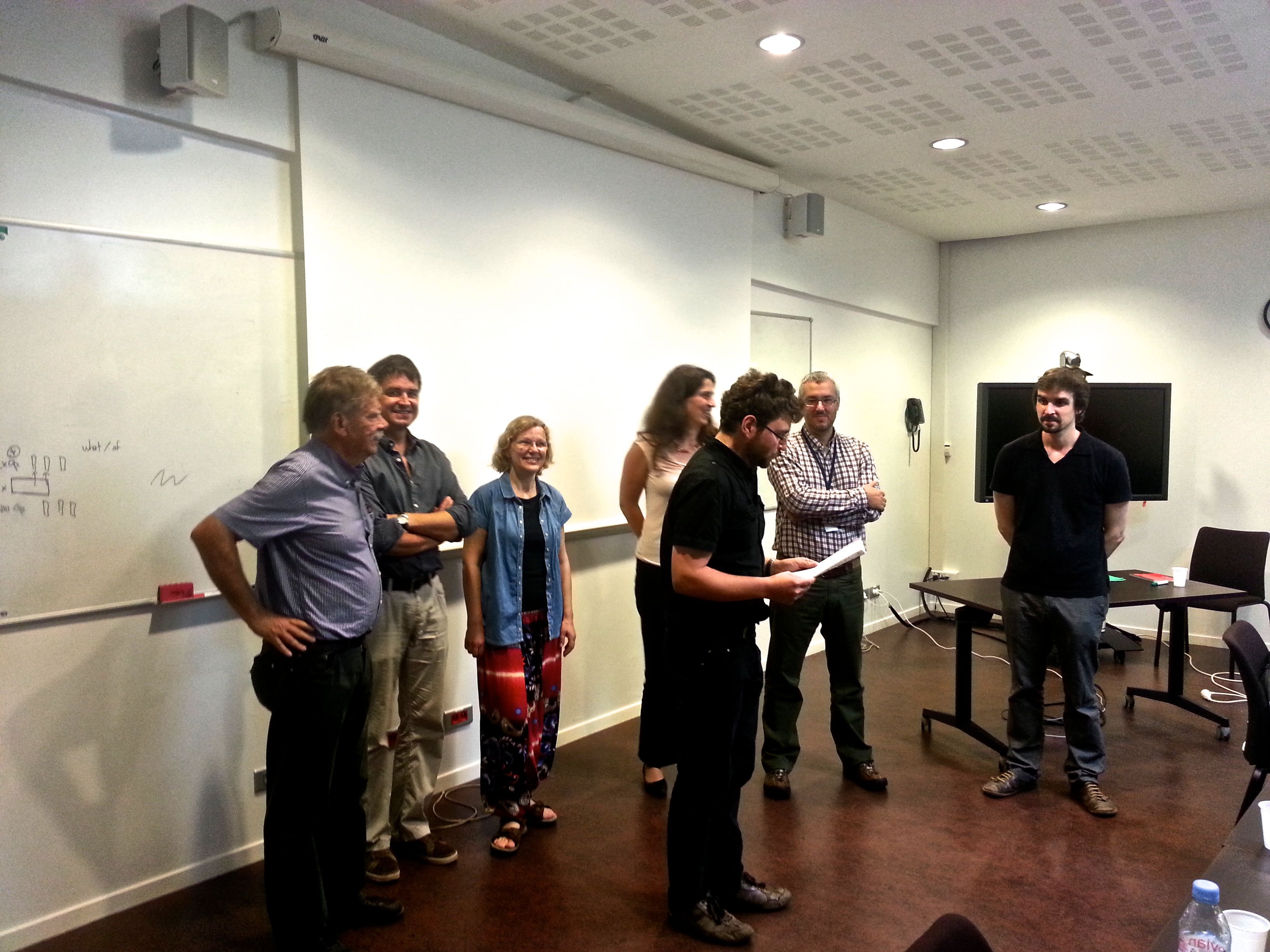
Permanent link to this article: https://team.inria.fr/oak/2013/09/26/julien-leblay-optimization-techniques-for-semistructured-semantic-web-data/
Sep 25
This exploratory one-year collaborative research project was funded jointly by the CNRS and the IDEX Paris-Saclay. It is coordinated by Ahmed Bounfour from the PESOR lab of U. Paris-Sud, and involves I. Manolescu, N. Bidoit and B. Cautis from OAK as well as V. Fernandez from Telecom ParisTech. The project aims at developing a common conceptual framework for the analysis and specification of business models based on the cloud.
Permanent link to this article: https://team.inria.fr/oak/2013/09/25/peps-interdisciplinary-project-bizmodel4cloud-accepted/
Sep 23
The tutorial “Entity Resolution in the Web of Data” by Kostas Stefanidis, Vasilis Efthymiou, Melanie Herschel and Vassilis Christophides has been accepted for presentation at CIKM 2013.
Permanent link to this article: https://team.inria.fr/oak/2013/09/23/cikm-2013-tutorial-entity-resolution-in-the-web-of-data/
Sep 13
13.45, room 445, PCRI
Abstract
Web mashup or mashup development is a Web 2.0 software development approach in which users are expected to create applications by combining data sources, application logic and UI components together to cater for their situational application needs. However, in reality creating even a simple mashup application is a complex task and that can only be managed by skilled developers.
Examples of ready mashup models are one of the main sources of help for users who don’t know how to design a mashup, provided that suitable examples can be found (examples that have an analogy with the modeling situation faced by the user). Tutorials, expert colleagues or friends, etc. are few other typical means to find development help. However, searching for such kind of help does not always lead to a success, and retrieved information is only seldom immediately usable as it is, since the retrieved pieces of information are not contextual. Motivated by the development challenges faced by a naive user of existing mashup tools, in this research the main focus is to aid less- skilled users in mashup development by enabling assisted reuse of pattern-based composition knowledge. In this talk I will demonstrate how such development assistance can be provided with the help of contextual, interactive recommendations of composition patterns that are harvested from the existing composition models in mashup tools. I will explain in details how the related challenges for this research thread are tackled from the algorithmic as well as from the application perspectives. I will briefly explain the primary assumptions behind this research as well as I will report the result of my research and demonstrate the efficiency of new set of algorithms for contextual pattern retrieval and reuse.
Permanent link to this article: https://team.inria.fr/oak/2013/09/13/soudip-roy-chowdhury-assisted-reuse-of-pattern-based-composition-knowledge-for-mashup-development/
Jul 13
“Answering Why-Not Questions”
Nicole Bidoit, Melanie Herschel and Katerina Tzompanaki
“CliqueSquare: Efficient Hadoop-Based RDF Query Processing”
Francois Goasdoue, Zoi Kaoudi, Ioana Manolescu, Jorge Quiane-Ruiz and Stamatis Zampetakis
“Delta: Scalable Data Dissemination under Capacity Constraints”
Konstantinos Karanasos, Asterios Katsifodimos and Ioana Manolescu
“Warehousing RDF Graphs”
Dario Colazzo, Francois Goasdoue, Ioana Manolescu and Alexandra Roatis
Permanent link to this article: https://team.inria.fr/oak/2013/07/13/four-papers-accepted-in-bda-2013/